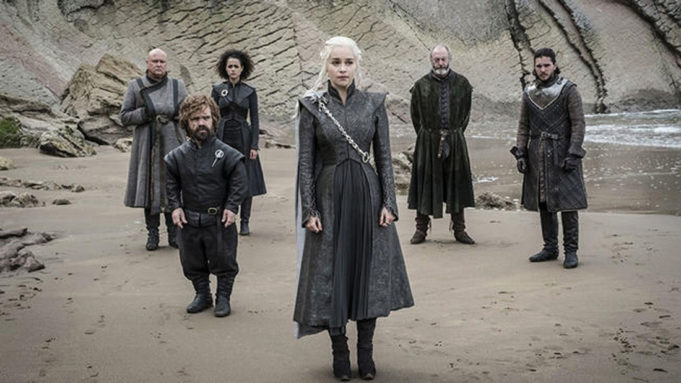Game of Thrones’ final episode airs this Sunday, bringing an end to eight seasons and almost a decade’s worth of stories, beloved characters, and massive hype. While other shows like Breaking Bad and Lost drew large numbers of viewers to their finales, this one is different. Lay its success at the mainstreaming of geek culture, the intricately plotted and unpredictable books, or just the simple formula that South Park dubbed “titties and dragons,” but GoT has captured attention worldwide like few shows have. It’s garnered awards for cast members like Peter Dinklage, made stars out of others like Sophie Turner, and generated a cash-cow kingdom’s worth of merchandise. As it comes to a close, it’s also facing the kind of backlash many other beloved and sometimes controversial works of art do, leading many to wonder if the finale can match what has come before it.
For anyone who hasn’t spoken to another television-watching human in the past few years, GoT is based on George R.R. Martin’s A Song of Ice and Fire fantasy book series (the first entry of which gives the show its name) and follows the major houses of the continent of Westeros as they vie for power to rule the Seven Kingdoms. Think: the War of the Roses in a fantasy setting, with way less magic and wizards than in J.R.R. Tolkien’s Middle-earth and a lot more violence and political maneuvering. Throw in well-written and -acted characters, epic battles, and some dragons, and it’s no wonder the show’s fandom spread like wildfire, from memes and convention cosplaying to podcasts and YouTube channels for reaction and discussion.
Part of that is due to the strength of the source material. A Game of Thrones was first published in 1996, arriving in the wake of Tad Williams’ sprawling and mature trilogy Memory, Sorrow, and Thorn by adding layers of depth, detail, and unpredictability to the high-fantasy genre. A sequel, A Clash of Kings, followed in 1999 to critical and commercial success, and the series eventually expanded from a proposed trilogy to seven books. With 15 years of fandom to draw upon, the TV show was a risk but not an uncalculated one. By the end of the first season, with its shocking death of the morally upright–seeming main character Ned Stark (Sean Bean), the show was propelled to hit status. When the Season 3 episode “The Rains of Castamere” slew an unprecedented number of main characters, it made the show a phenomenon.
But the ending was always in sight, prompting long rumors of successor shows, such as prequels based on the mythic “Long Night,” as well as HBO trying to capture lightning twice with another prestige fantasy show in Westworld. Oh, and don’t forget other networks vying for fantasy viewers, with Amazon announcing a Lord of the Rings prequel series with a reported $1 billion budget.
Reaching the ending, however, would prove challenging and lead the show to some of the harshest criticism it has faced. When Game of Thrones first premiered, only four of the planned seven books had been published. The fifth book, A Dance With Dragons, was published in July 2011, shortly after the conclusion of the first season. The show expanded and combined elements from the available books and fully surpassed them in Season 6, allowing readers to discover along with viewers whether certain characters would come back from the dead and why Hodor is named “Hodor.” This also meant the show’s writers were writing the story themselves, guided only by what little Martin had written of the forthcoming books and his own broad plans for the series. Now, the series is ending before the penultimate book, The Winds of Winter, has hit store shelves, and the fandom has gone from understanding a “changing of the guard” in Season 6 to having some complaints in Season 7 to outright rebellion in Season 8. They argue the story has become less intricately plotted and with larger leaps of logic for the characters than before, and the last few episodes of Season 8 have been seen by some as a sign of the show’s downfall as it runs out of book material to adapt. They feel that the show’s truncated number of episodes for the final two seasons has created a rush to the ending that forces characters to act uncharacteristically for the story’s sake. But not all fans see it that way, and the Twitter-verse has been a battlefield of harsh words and hilarious memes the past few weeks, several of the more hilariously critical ones making some valid points.
Whether the ending turns out good like Breaking Bad and Gravity Falls or bad like Dexter and How I Met Your Mother remains to be seen. What is certain is that the ending will be seen, analyzed, and debated by millions around the globe. Like the best genre works – Star Wars, Star Trek, and Lord of the Rings – the only thing almost as fun as watching Game of Thrones is engaging with fellow fans of it. Well, that and seeing the final books eventually published and the book-to-show comparisons that those will (hopefully) one day bring.












